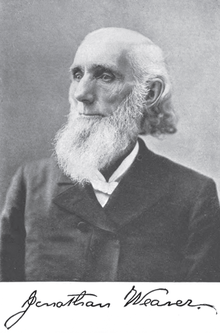Jonathan Weaver (bishop)
Jonathan Weaver (February 23, 1824 – February 6, 1901) was a 19th-century bishop of the Church of the United Brethren in Christ, and employed by Otterbein College.
Jonathan Weaver | |
|---|---|
 | |
| Born | February 23, 1824 |
| Died | February 6, 1901 (aged 76) |
| Resting place | Woodland Cemetery and Arboretum |
Early life
Weaver was born in Harrison Township, Carroll County, Ohio[1] on February 23, 1824.[2][3] He was the youngest of twelve children, grew up on a farm, and attended public schools.[2] He converted at a camp meeting in 1841, when he was 17.[2][3]
Career
In 1847, Weaver entered the Muskingum Conference. In 1848 he was ordained by Bishop Glossbrenner.[2] In 1851 he was chosen presiding elder, and in 1857, he was a delegate to the General Conference at Cincinnati.[2] The trustees of Otterbein College hired him as soliciting agent, a post he served for eight years. In 1861, the General Conference elected him bishop for the Pacific Coast. He declined, preferring to stay with the college.[2]
In 1865, Weaver campaigned to be editor of the Religious Telescope. He lost election, but was instead selected by the General Conference to the office of bishop.[2] In matters of policy, he was a moderate, often refusing to take a public position,[2][3] but he was better as a preacher and author.
As a preacher he excelled. The pulpit was his throne, and when once on that throne he was a master of men. The art of public address was next to perfect in him, though, perhaps, he never studied rhetoric under a teacher an hour in his life. He was a born orator. His speech had the charm of magic, the magic was all divine.
In many respects he was of the Abraham Lincoln type - simple in life, unique in style, trenchant in humor, and eloquent and forceful in argument. His very presence in the public assembly was always an inspiration.— W.M.Weekley, 1911[3]
In 1893, age began to catch up with Weaver, and he was relieved of active duties, and elected bishop emeritus.[2] Weaver died February 6, 1901.[3]
Publications
- Weaver, Jonathan (1892). A Practical Comment on the Confession of the Faith of the United Brethren in Christ. Dayton, Ohio: United Brethren Publishing House.
- Weaver, Jonathan (1899). Heaven or That Better Country. Dayton, Ohio: United Brethren Publishing House.
- Weaver, Jonathan (1900). Christian Theology. Dayton, Ohio: United Brethren Publishing House.
- Weaver, Jonathan; Small, D.D. (eds.). Christian Doctrine. Dayton, Ohio: United Brethren Publishing House.
- Weaver, Jonathan. Discourses on the Resurrection. Dayton, Ohio: United Brethren Publishing House.
- Weaver, Jonathan (1891). Divine Providence. Dayton, Ohio: United Brethren Publishing House.
- Weaver, Jonathan (1878). The Doctrine of Universal Restoration Carefully Examined. Dayton, Ohio: United Brethren Publishing House.
- Weaver, Jonathan (1873). Ministerial Salary. Dayton, Ohio: United Brethren Publishing House.
References
- Howe, Henry (1907). Historical Collections of Ohio, The Ohio Centennial Edition. The State of Ohio. p. 365.
- Berger, Daniel (1910). History of the Church of the United Brethren in Christ. Dayton, Ohio: United Brethren Publishing House. pp. 333–337.
- Weekley, W.M.; Fout, H.H. (1911). "IX Jonathan Weaver". Our Heroes or United Brethren Home Missionaries. Dayton, Ohio: The United Brethren Publishing House. pp. 140–154.